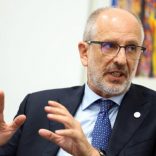Trump sets 50% U.S. tariffs on copper, Brazilian imports starting In August
CPLP: Investment by IFC in African members doubles in decade, to rise further

Investment by the International Finance Corporation in members in Africa of the Community of Portuguese-Language Countries (CPLP) has doubled in the last decade and the intention is to “strongly increase” its presence, the institution’s regional vice president for Africa has said.
“On the IFC side, we are very interested in strongly increasing our participation, our investments, in Portuguese-speaking countries, not only in Mozambique and Angola, but also in other countries where historically we have been less present,” Sérgio Pimenta told Lusa via video conference from Washington.
He recalled that the IFC – the World Bank Group institution that finances the private sector – has had a presence in Mozambique for several years and has had an office in Luanda since 2019, as well as working with Cabo Verde via the World Bank.
Figures from the IFC show that its portfolio in Angola, Cape Verde, Guinea-Bissau, Equatorial Guinea, Mozambique and Sao Tome and Principe has doubled in the last 10 fiscal years (2011-2021) to $267.5 million (€236.8 million) from $132 million.
According to Pimenta, an increase in business opportunities and interest from the private sector in Angola has contributed to this growth. Angola’s government, he noted, “has launched an ambitious reform programme and an economic transformation of the country” that, although slow, is already beginning to show results.
“There has been real progress that we are seeing in Angola and that has created conditions for private investors to be more interested in funding projects in Angola – not only foreign investors, who can bring capital, knowledge, more experience, but also Angolan investors,” he said, adding that, in this context, the IFC had developed “a relatively ambitious strategy, but with medium-term visibility,” including in the financial and tourism sectors.
“We have financed two banks to set up … credit lines that make it possible to promote Angola’s foreign trade,” Pimenta went on, noting that, by financing the banking sector, this has indirectly financed small and medium-sized companies, which in Africa often have great difficulty in obtaining credit due to high interest rates and internal banking requirements, a problem worsened by the pandemic.
Also to respond to the constraints caused by Covid-19, the IFC has financed a company in Angola’s hospitality sector.
“The tourism sector – leisure and business – is a very important sector of the economy in Africa,” he said. “After agriculture it is the sector that creates the most jobs, and it is a sector that has suffered tremendously worldwide because of the pandemic.”
The IFC also plans to work in Angola in the health, agriculture and agribusiness sectors, he added: “Angola has extraordinary agricultural potential that is not fully developed.
“We have an investment portfolio of just over $100 million [in Angola] to date, but this figure should increase sharply in the first months of 2022,” he went on, while stressing that everything depends on the progress of the reforms that the Angolan government has started and the investment capacity of the private actors that the IFC is monitoring.
In November, at the end of a visit to Luanda in which Pimenta took part, the World Bank (WB) announced that the institution would fund projects worth $1.5 billion between then and June of next year.
In Mozambique, Pimenta highlighted the funding announced in October of this year for the Temane power plant project – the largest power plant built in Mozambique after independence, as part of a debt package of $494 million.
This project, he noted, “illustrates well the IFC’s capacity, not only to provide funding, but to mobilise funding from other partners and, working with the WB, help the government structure a project that is then built and financed by the private sector.”
In Mozambique, the IFC has also provided credit lines for foreign trade and has a portfolio of projects in the forestry, agriculture and agribusiness sectors, a sector that “also has a lot of potential,” Pimenta said.
For Cabo Verde, the IFC has a partnership with the WB that allows it to have an indirect presence in the country via the latter’s office there.
The institution has been increasing its presence in Cabo Verde, with “visits, meetings, contacts, participation in events, dialogue with the government, dialogue with the private sector, dialogue with development partners and this is bringing its results,” he said. “We have a pipeline of real projects in Cabo Verde today that I think we will be able to sign in the coming months.”
With Guinea-Bissau, Sao Tome and Principe and Equatorial Guinea, the IFC hopes to use a partnership announced last week with the African Development Bank (AfDB) and its Development Finance Compact for Portuguese-Speaking African Countries, or Lusophone Compact, as an opportunity to “really do more operations in those countries,” Pimenta said. “I think it is a strong opportunity and I am confident we will get there.”
The IFC regional vice president recalled that the role of the institution “is to support the development of the private sector in the objective of development” of the countries where it operates.
“It is not just funding a project for the joy of funding a project, it is really because these projects will have an impact in terms of job creation, in terms of creating economic activity, in terms of regional integration and in terms of promoting quality of life, particularly for young people and women,” he stressed.












Leave a Reply
Be the First to Comment!
You must be logged in to post a comment.
You must be logged in to post a comment.